| HEALTH JIGSAW | Call us now 0403-009-277 |
June 2011
Welcome to the June Newsletter. Brrr! You know winter is upon us when it takes you twice as long to get out of bed (or is that just me?). Winter is the season when some people put on a few extra centimetres around the waist. It’s also the time of the year which is normally associated with coughs and sniffles. Hopefully you can win the battle on both fronts this year. |
 |
In this month's newsletter:
- Exercising in winter.
- Fighting off winter colds and flu.
- City to Surf training.
- One kilogram of fat.
- Vegetarian diets.
- Interesting stuff.
Eat well and train hard.
Andrew ![]()
Exercising in Winter
When it's cold and dark outside it is easy to talk ourselves into putting our exercise programs on hold. Winter is the season when some people put on a few extra centimetres around the waist. But as we all know, the secret to healthy weight management is to eat well and exercise regularly, even in winter.
Regular exercise is also one of the best ways to boost your immune system and fend off the colds and flu.
Here are a few tips for exercising in winter:
- If you normally train at a gym in the evening, go straight there after work. If you go home first, you’re more likely to get comfortable and warm and less likely to venture out in the cold again.
- Warm-up is important at any time, but especially during the colder months. Cold temperatures can make your muscles tight and therefore they are more prone to injuries.
- Choose clothes that wick moisture away from your skin to keep dry. You should avoid sweating that causes the clothing layer closest to your skin to get wet and cause you to be chilled.
- Wear a few layers of lightweight clothing rather than a heavy jacket over a single layer. Wearing multiple, lighter layers will actually keep you warmer than one or even two heavy layers. The top layer should be both wind and water resistant.
- When you stop exercising, take off any wet clothes as soon as possible and put on a jacket and tracksuit pants to avoid getting a chill.
- Drink plenty of water. It's just as important to stay hydrated when exercising in winter as it is in summer, even though you might not feel as thirsty.
- People with asthma should make sure they carry their medication as they are more susceptible to asthma with the cold air.
Fighting Off Winter Colds and Flu
| The winter months are normally associated with sniffling and sneezing of the common colds or flu. However, there are several simple steps you can take to ensure that you can enjoy the colder weather instead of sneezing into a box of tissues. | 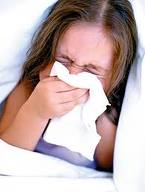 |
- Exercise regularly (see above).
- Eat a balanced diet that is rich in fruit and vegetables and limit your sugar intake. There is research which shows that sugary foods can weaken your immune system.
- Practice good hygiene. Colds and flu viruses are spread from person to person as droplets in the air via sneezing or coughing. Touching infected surfaces, such as door handles or when shaking hands, and then passing the virus from the hands to the mouth, nose or eyes is another route of infection. Wash your hands or use a hand sanitiser regularly, especially before eating or touching any food.
- Get plenty of sleep every night.
- If you have the flu, stay home from work to prevent spreading it to others and keep children home from school.
- Don't smoke - smokers are more likely to catch colds and flu as the smoke from cigarettes irritates airways and this can lead to increased vulnerability to colds.
There is no cure for colds or flu. Antibiotics, which treat infections due to bacteria, do not work on cold and flu viruses. However, there are things you can do to help you feel better.
- Drink plenty of water to prevent dehydration.
- Paracetamol may help relieve the fever and pain and decongestants can help a blocked nose. Talk to your doctor or pharmacist.
- Eat a balanced diet with plenty of fruit and vegetables.
- Get plenty of rest and don’t go back to work too early.
- Don't smoke or drink alcohol.
City to Surf Training
This year’s City to Surf will be held on Sunday 14 August, which means that it’s time to start training regardless of whether you’re doing it for the first time or you’re aiming to beat your best result.
Whether you’re walking, jogging or running the City to Surf, you should be putting the effort in your training now. Work backwards from August 14 to see how many weeks of training you have left before the City to Surf and set yourself targets each week. Ideally you should at least attempt the distance (14km) a week before race day.
Beginner
If you have never done the City to Surf before or are not used to doing a lot of running, it’s crucial for you to start slowly and then build up your training. The important factor is not speed, but rather clocking up the kilometres. Start with walking, building up to running for a section and then back to walking.
Note: If you are new to exercise, over 40 years old, have a health problem, or take regular medication, check with your doctor before commencing your training.
Intermediate/Advanced
If you have done the City to Surf before, your goal should be to beat your best time or be quicker than last year. Aim to build your training to beyond the 14km distance, up to around 20km depending on your target finish time.
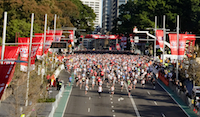
![]()
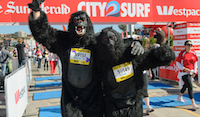
Here are a few tips to get your training started.
- You should aim to do at least two runs each week, maybe a shorter one during the week and a longer run on the weekend.
- The best way to see how your training is going and to motivate yourself is to record the distance and time each run you do. Use Google Maps to work out the distance of your runs. Or if you’re after an online training diary, MapMyRun.com is an excellent website which can track your runs as well as roughly working out how many calories/kilojoules you burn.
- Keep your training interesting by walking/running along scenic routes (like the beach or across the Harbour Bridge) instead of suburban streets.
- Choose a route with one or two hills to help prepare you for “Heartbreak Hill” (the 2 km climb from Rose Bay to Vaucluse).
- Interval training is one of the best ways to increase your fitness - it's a great way to get your legs ticking over at a faster pace so they adapt to higher demands. For example, you can run quicker for a minute and then drop back to your normal pace. Or run at a faster pace past three telegraph poles before dropping back to normal speed.
- Consider training with a friend to make it easier to stay motivated.
- Set yourself targets to achieve in each training session and reward yourself (like a sports massage) with if you meet them.
- Stretch for at least 5 to 10 minutes after your training session to help your recovery and minimise muscle soreness.
- Drink plenty of water before, during and after your training sessions.
- Include a couple of rest days in the week to give your body a chance to recover and prevent burnout.
Don't forget to keep training after the City to Surf to maintain a healthy heart. Feel free to contact us if you need specific help with your preparation.
Kayak Day Photos
Photos from out last kayak day till spring. The rain stayed away and it was a little cool but overall a good morning out in the harbour. The hot chocolates and coffees at Nielsen Park warmed us up |
One Kilogram of Fat
When we regularly eat more energy than our body needs, the excess is stored inside fat cells. To lose a kilogram of body fat, you would need to cut back your food intake and/or work off 37,000 kilojoules, or around 5,000 kilojoules a day. |
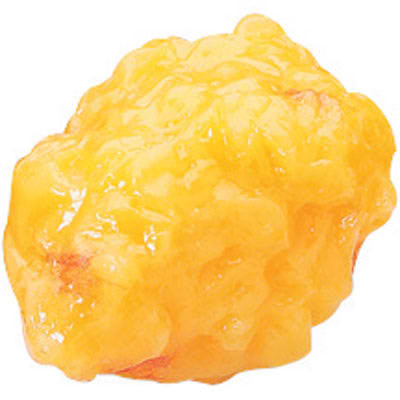 |
Vegetarian Diets
If you are or are considering becoming a vegetarian, keep in mind to maintain a healthy diet to ensure that your body is not deprived of important nutrients and vitamins normally found in animal products. |
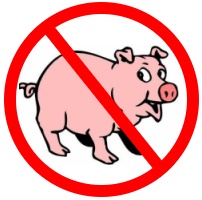 |
Interesting Stuff
| In addition to eNewsletters and blogs, we also provide other health and fitness information on our Facebook page. For those of you who are not on Facebook, below are our posts during May 2011: |
- Weight loss pills [Australians will spend nearly $800 million this year in an effort to slim down. Do weight-loss pills really work?]
- How to eat right when you're travelling or on holiday [Here are a few tips on healthier eating when you travel.]
- Iron and your teen [Are your teenage kids eating enough iron?]
- Holy Shhh-ugar [If you're exercising for 60-90 minutes, water is the best for re-hydrating yourself...you do not need "sports drinks", they are full of sugar.]
- Breakfast: The most important meal of the day [It is very important to have breakfast every day - people who skip breakfast have been shown to eat more throughout the day than those who have breakfast.]
- Heart disease in women [Heart disease is the number one killer of women in Australia, but it is largely preventable. You can control risk factors such as smoking, high blood pressure, high cholesterol, lack of exercise, poor diet, excessive alcohol consumption, obesity and depression.]
- Bigger not better for Blues rookie Trent Merrin [Story of how Trent Merrin went from a 14 year old 110kg kid to playing for his state through discipline, hard work and sacrifice.]
- Hormones in our food [Hormones in beef, antibiotics in chicken and pesticides on fruit - Nutritionist Matt O'Neill explains what you need to be concerned about.]
- Meat substitutes [Consumer group Choice put a handful of vegetarian meat substitutes to the test, rating both nutritional value and taste.]
Nothing contained in this Newsletter is intended to be used as medical advice and is not intended to be used to diagnose, treat, cure or prevent any disease, nor should it be used for therapeutic purposes or as a substitute for your own health professional's advice.
Our mobile personal trainers/fitness coaches can come to you in the following areas of Sydney:
If you want to engage our services at a location we have not listed above, please contact us as we may be able to cater to your request. |
CONNECT & SHARE
Keep up to date with the latest events, photos and health and fitness tips.
SUBSCRIBE TO OUR NEWSLETTERS
Telephone:
0403-009-277
Email:
andrew@healthjigsaw.com
